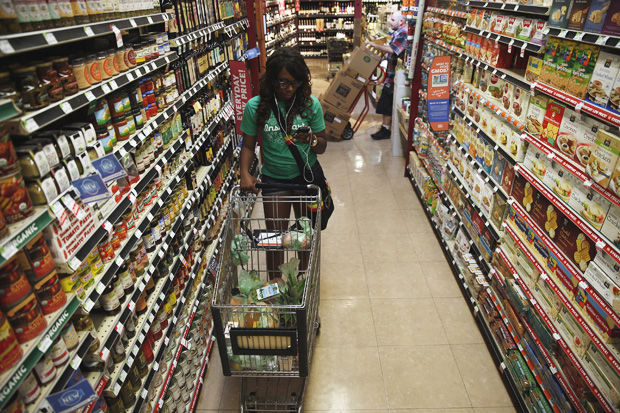Doling out the dollars: Restricting EBT purchases infringes on freedoms
Instacart shopper Kara Pete looks over a list of groceries as she walks the aisles of Whole Foods for customer Tricia Carr on Sept. 12, 2014 in Sherman Oaks, Calif.
April 14, 2015
A Republican state lawmaker in Missouri is sponsoring legislation which will severely limit what food stamp recipients can buy, according to a recent article by The Washington Post.
The proposed bill would ban the purchase of “cookies, chips, energy drinks, soft drinks, seafood or steak” using food stamps.
Rick Brattin, the representative pushing for this new bill, said “The intention of the bill is to get the food stamp program back to its original intent, which is nutrition assistance,” according to The Washington Post.
“It just seems really repressive,” said Mark Rank, a professor at Washington University and author of the book “Living on the Edge: The Realities of Welfare in America,” according to the Chicago Tribune. “I don’t see how it makes any sense to ban some of these foods. Fish is something that should really be in your diet. And steak, what does that mean in this context?”
Plus, trying to tell people what they can and can’t buy with federal aid is foolish. It’s something that isn’t anyone’s business besides the recipient.
Brattin also insisted that people are abusing the current system by spending EBT money on luxury foods. “I have seen people purchasing filet mignons and crab legs with their EBT cards,” he said. “When I can’t afford it on my pay, I don’t want people on the taxpayer’s dime to afford those kinds of foods either.”
Not only does Brattin sound childish with that statement, but he’s also trying to say that people on food stamps are able to spoil themselves with luxury foods.
Currently, a household of one person can qualify for $194 a month, which is less than $7 per day, from the Supplemental Nutrition Assistance Program (SNAP), according to the Department of Agriculture.
That is not the kind of food budget where people can buy whatever they want; they must spend frugally to keep themselves well-fed. With a fixed monthly income, it is entirely the choice of the recipient how they spend their money for food. If they choose to blow their money on fancier foods, then they will have less to spend later.
Those on federal aid should not have to feel restricted on the food they purchase using their food stamps. They know how much they have to spend and can make their own responsible decisions. They are not carelessly spending money on whatever yummy food they’re craving, as Brattin suggests. The government does not have the right to tell anyone what groceries they can and cannot buy, whether they’re on federal aid or not.









